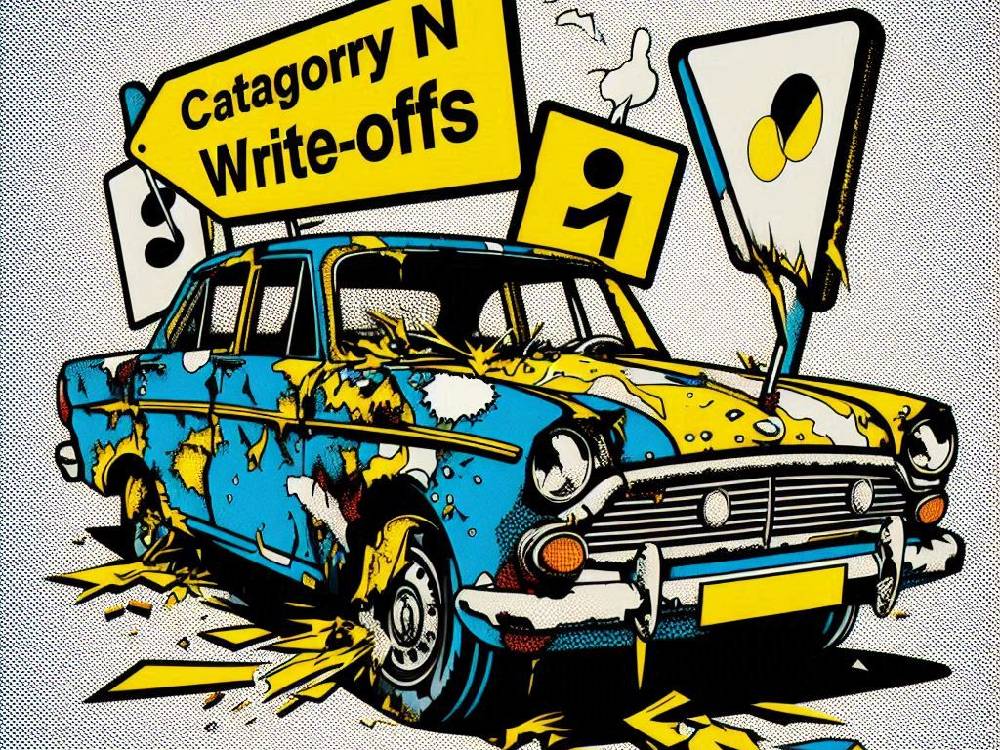Understanding Category N Write-Offs In Car Insurance

Introduction
Category N…
When you’re on the hunt for a car, understanding its insurance category is crucial.
Why?
If you come across a car labeled as N (Cat N), you might wonder what it really means.
And why it matters to you.
In simple terms, Cat N vehicles haven’t suffered structural damage.
They’re safe to drive if repaired properly.
But there’s more to consider.
What Does It Mean?
A Category N (Cat N) classification indicates a car has non-structural damage.
No damage affects the core safety structure, like the chassis or frame.
But that doesn’t mean repairs aren’t needed.
So, what kind of damage are we talking about?
It could be cosmetic—think dents and scrapes.
Or, it might be more extensive, like issues with suspension or electronics.
Insurers classify these cars as uneconomical to repair.
In other words, it’s cheaper to write them off than to fix them.
But that doesn’t make them useless.
In fact, many of these vehicles are still roadworthy, with the right repairs.
Want to find affordable insurance for vehicles like this?
Check out our guide on the cheapest cars to insure in the UK.
Differences Between Categories
Ever heard of Category D (Cat D)?
It’s a classification that Cat N replaced back in 2017.
Both Category N and D cars had minor or cosmetic damage.
But here’s the kicker.
Category N specifically tells you the car’s structural integrity remains intact.
No hidden dangers.
Cat D, on the other hand, had a broader scope of damage types.
While Cat D no longer applies to newly written-off cars, you might still see it on older vehicles.
So, what’s the takeaway?
Cat N offers transparency, letting you know the car is safe—if repaired.
Want to dive deeper into recent insurance costs?
Take a look at our article on why car insurance has risen in 2024.
What Is Category N Damage?
Now, let’s talk about Cat N damage.
In short, Cat N cars suffer non-structural issues.
That means the main frame remains intact.
No need to worry about core safety risks.
But there’s a catch.
Damage can vary, sometimes involving more than cosmetic fixes.
Here’s what you might see with Cat N damage:
Bodywork scrapes, dents, or paint issues
Problems with suspension, brakes, or steering
Electrical faults that need attention
Yes, these cars are safe to drive once repaired.
But that doesn’t mean you should skip a history check.
Without proper repairs, minor issues can turn into costly problems.
Can A Category N Car Be Returned to the Road?
Good news.
You can legally return a Cat N car to the road once it’s repaired.
Here’s how.
First, notify the DVLA of its Cat N status.
This keeps the records accurate and protects future buyers.
Second, make sure a professional completes the repairs.
Roadworthiness comes first.
And the best part?
Unlike Cat S cars, a Cat N vehicle doesn’t require re-registration.
But don’t stop there.
Having a qualified mechanic inspect the car not only provides peace of mind-
but also ensures that every detail has been checked.
After all, it’s all about knowing that your vehicle is truly safe on the road.
Plus, some insurers may require proof of repairs for coverage.
Want more money-saving tips?
Check out our tips on saving money.
Should I Buy?
Thinking of buying a Cat N car?
It can be a fantastic way to save money.
But there are a few things to keep in mind.
First, the lower purchase price makes Cat N cars attractive.
But insurance costs might be higher.
Some insurers even refuse to cover them altogether.
And here’s something else.
You need a full history check.
This gives you a complete picture of past damages and repairs.
Consider getting a thorough inspection before you commit.
This reveals any unresolved issues and avoids surprises down the road.
Looking to understand how credit scores impact insurance?
Explore our credit score and insurance guide.
Check
Unsure if a car is Cat N?
Here’s how to confirm.
A Cat N marker should appear on the vehicle’s history report.
But you need to dig deeper.
Using a service like car data check helps verify any past write-offs.
Why bother?
It’s simple.
Knowing a car’s history gives you peace of mind.
If the previous owner didn’t fix the damage properly, you could end up paying the price.
Don’t skip this step.
It saves you from unexpected costs and potential safety issues.
Insurance Costs
Let’s talk about insurance.
Cat N cars often cost more to insure.
Why?
Some insurers worry about past damage, even if it’s non-structural.
Others may require an inspection before offering coverage.
In some cases, an insurer might refuse to cover a Cat N car.
But don’t lose hope.
Many insurers do offer options.
You may just pay a bit more.
Keep this in mind when budgeting for a Cat N vehicle.
Want a breakdown of car insurance costs?
Explore our guide on navigating UK car insurance expenses.
Can You Remove A Category Marker?
Here’s an important fact.
Once a car has a Category N marker, it’s permanent.
You can’t remove it.
This designation stays with the car for life.
But why does that matter?
Simple.
A Category N marker affects resale value and can complicate future insurance.
Even if the car runs perfectly, potential buyers will see the Category N status.
It’s a good idea to weigh this into your decision if you plan to resell.
Want more insight into how car write-offs impact value?
Check out our guide on what invalidates car insurance.
Conclusion
Buying a Category N car offers tempting savings, but it comes with risks.
If you’re set on a Category N vehicle, make sure to do your homework.
Check its history.
Verify all repairs.
Budget for potentially higher insurance premiums.
And remember, not all insurers will cover this type of car without a full inspection.
So, is it worth it?
For some buyers, yes.
But only with the right preparation.
For more insights, see our related guides on:
Cheap Car Insurance for High-Value Vehicles
Has Your Insurer Refused To Renew?
Has Your Insurer Refused To Renew?
The post Understanding Category N Write-Offs In Car Insurance appeared first on Cheap Car Insurance.







